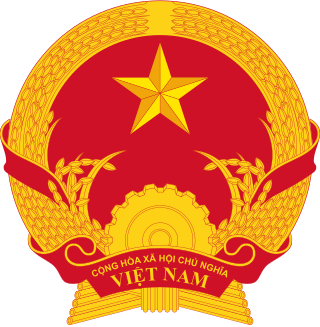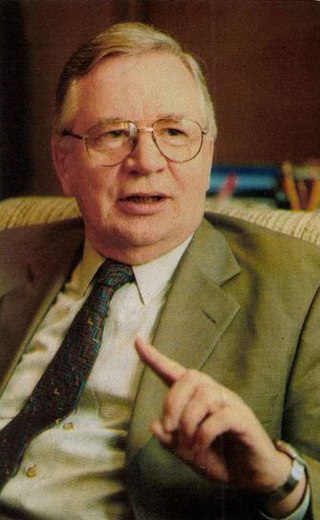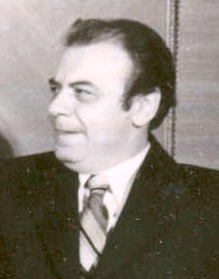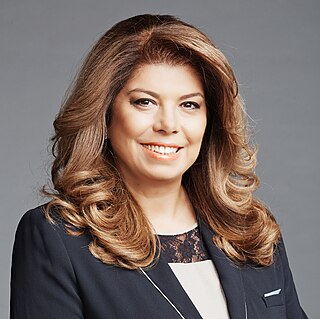
The President of the Republic of Bulgaria is the head of state of Bulgaria and the commander-in-chief of the Bulgarian Army. The official residence of the president is at Boyana Residence, Sofia. After the completion of the second round of voting, candidate Rumen Radev was elected President of Bulgaria on 13 November 2016.

Petar Stefanov Stoyanov is a Bulgarian politician who served as President of Bulgaria from 1997 to 2002. A member of the Union of Democratic Forces (UDF), he was the party's nominee to succeed one-term president Zhelyu Zhelev in 1996. He was elected to the Presidency in 1996, but lost his reelection bid in 2001. Following a brief retirement from politics, he became an MP in 2005 and later Chairman of UDF from 1 October 2005 to 22 May 2007. He resigned following the 2007 European Parliament election.

The president of the Socialist Republic of Vietnam is the head of state of Vietnam, elected by the National Assembly of Vietnam from its delegates. Since Vietnam is a one-party state, candidates for the post are nominated by the Central Committee of the Communist Party of Vietnam. The officeholder is generally considered to hold the second-highest position in the political system, practically after the General Secretary of the Communist Party of Vietnam.

Zhelyu Mitev Zhelev was a Bulgarian politician and former dissident who served as the first democratically elected and non-Communist President of Bulgaria, from 1990 to 1997. Zhelev was one of the most prominent figures of the 1989 Bulgarian Revolution, which ended the 35 year rule of President Todor Zhivkov. A member of the Union of Democratic Forces, he was elected as President by the 7th Grand National Assembly. Two years later, he won Bulgaria's first direct presidential elections. He lost his party's nomination for his 1996 reelection campaign after losing a tough primary race to Petar Stoyanov.

The president of the German Democratic Republic was the head of state of the German Democratic Republic, commonly known as East Germany, from 1949 until 1960. The office was created by the Constitution of 1949. The president of the Republic was elected by the People's Chamber (Volkskammer) and the Chamber of States (Länderkammer), the two chambers of parliament. The office was mostly ceremonial in nature. If necessary, the President of the Volkskammer acted as the president of the Republic.

Mátyás Szűrös is a Hungarian politician. He served as provisional president of the Republic from 23 October 1989 to 2 May 1990. His presidency occurred during Hungary's transition from Communism to democratic government.

The National Assembly (Bulgarian: Народно събрание, romanized: Narodno Sabranie is the unicameral parliament and legislative body of the Republic of Bulgaria. The first National Assembly was established in 1879 with the Tarnovo Constitution.

Petar Toshev Mladenov was a Bulgarian communist diplomat and politician. He was the last leader of the Bulgarian People's Republic from 1989 to 1990, and briefly the first President of the Bulgarian Republic in 1990.

The vice president of the Republic of Bulgaria is a position, established by the Constitution of Bulgaria, and the only active vice presidential office in the European Union (EU).

The Socialist Republic of Serbia, previously known as the People's Republic of Serbia, commonly abbreviated as Republic of Serbia or simply Serbia, was one of the six constituent republics of the Socialist Federal Republic of Yugoslavia in what is now the modern day states of Serbia and the disputed territory of Kosovo. Its formation was initiated in 1941, and achieved in 1944–1946, when it was established as a federated republic within Yugoslavia. In that form, it lasted until the constitutional reforms from 1990 to 1992, when it was reconstituted, as the Republic of Serbia within the Federal Republic of Yugoslavia. It was the largest constituent republic of Yugoslavia, in terms of population and territory. Its capital, Belgrade, was also the federal capital of Yugoslavia.

The president of the Republic of the Union of Myanmar is the head of state and constitutional head of government of Myanmar. The president chairs the National Defence and Security Council and normally leads the Cabinet of Myanmar, the executive branch of the Burmese government, though the military prime minister leads the cabinet under the current state of emergency. The current president is Myint Swe, who assumed the presidency through a military coup d'état on 1 February 2021. Though a constitutionally powerful position, the presidency is a largely symbolic post under the current military government, with Myint Swe appearing only to rubber-stamp military rule.

The Presidency of the Socialist Federal Republic of Yugoslavia was the collective head of state of the Socialist Federal Republic of Yugoslavia. It was established in 1971 according to amendments to the 1963 Constitution and reorganized by the 1974 Constitution. Up to 1974, the Presidency had 23 members – three from each republic, two from each autonomous province and President Josip Broz Tito. In 1974 the Presidency was reduced to 9 members – one from each republic and autonomous province and, until 1988, President of the League of Communists of Yugoslavia ex officio.

The Zhivkov Constitution was the third Constitution of Bulgaria, and the second of the Communist era. It was in effect from May 18, 1971 to July 12, 1991.

Petar Beron, born 14 March 1940 in Sofia, Bulgaria, is a Bulgarian academic and politician. He was leader of the United Democratic Forces (SDS) in from August 1990 to 4 December 1990. He was a vice-presidential candidate in 1992 and a presidential candidate in 2001 and 2006.

The Chairman (President) of the Republic of the People's Republic of Bulgaria was the head of state of Bulgaria from 3 April 1990 to 22 January 1992. The office was known as the Chairman (President) of the People's Republic of Bulgaria until the word "People's" was dropped from the country's name on 15 November 1990. From that point on, the office was simply the Chairman (President) of the Republic of Bulgaria.
Angel Angelov Dimitrov was a Bulgarian politician belonging to the Bulgarian Agrarian National Union (BANU). He served as Secretary of the Standing Committee of the Agrarian Union from December 1989 to March 1990. He was the last First Deputy Chairman of the State Council from 14 December 1989 until the State Council was disestablished on 3 April 1990.
The Socialist Republic of Croatia, one of the constituent countries of the Socialist Federal Republic of Yugoslavia had gone through a number of phases in its political life, during which its major political characteristics changed - its name, its top level leadership and ultimately its political organization.
A presidential election was held in Hungary on 26 February 2024. The President of the Republic is elected by Members of Parliament in an indirect election.














